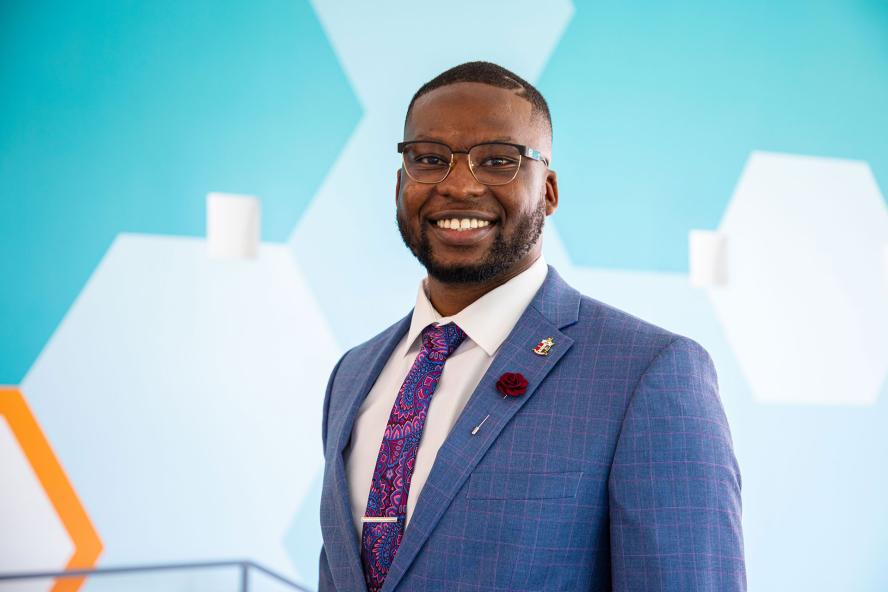Following in His Mother's Footsteps

By Dan O'Sullivan
After earning his undergraduate degree at Tufts, Kevin Lovaincy (BA in Sociology '18 and MA in Diversity, Equity, Inclusion, and Justice Leadership '20) wasn't sure what would come next. But he did know he had a passion for advocacy.
Lovaincy grew up in Cambridge, Massachusetts, the son of Haitian immigrants. Reflecting now, he realizes that his late mother, Solange Innocent Eloir, often served as an advocate on behalf of her family and their immigrant community. She passed on this enthusiasm for advocacy to her son.
In plotting his next move post-graduation, Lovaincy came to recognize working in the diversity, equity, and inclusion (DEI) field as a way to advocate for people, whether in the private or public sector. "So I looked into the DEIJ-L [Diversity, Equity, Inclusion, and Justice Leadership] master's program, applied, and got in," he says.
In September 2022, two years after completing his graduate degree, Lovaincy became the first Executive Director of Diversity, Equity, and Inclusion at Quinsigamond Community College (QCC) in Worcester, Massachusetts. In this leadership role, he is responsible for ensuring the school promotes inclusion and is equitable in its offerings.
Faculty Who Are Mentors and Role Models
Lovaincy was part of the DEIJ-L program's first full-time cohort. He developed a close bond with the six other students in the group while also finding strong mentors and role models in professors like Silas Pinto, Keith Maddox, and Julian Agyeman.
"It meant a lot to me to have faculty of color, especially faculty of color who were males," he says. "They didn't allow me to be just average—they pushed me to be my best. I can't thank them enough for that."
Besides offering a deep dive into DEIJ issues, Lovaincy credits the program with cultivating his ability to think critically. "I don't just accept information as is; the program provided me a framework to examine certain situations and understand why something has happened," he says. "That's made me better equipped to navigate my professional career and personal life."
Before completing the DEIJ-L program, Lovaincy joined the Massachusetts Department of Public Health (DPH) as Assistant Director of Diversity and Inclusion for public health hospitals. He gained valuable experience serving as the affirmative action officer, working with veterans and other affinity groups, aligning the hiring process with DEI objectives, hosting DEI trainings in a hospital setting, and more. Within less than a year, he was promoted to Acting Director of Diversity, Equity and Inclusion for the DPH.
A Seat at the Table
The opening at QCC appealed to Lovaincy on several levels. He relished the opportunity to create a platform for underserved, marginalized communities to be heard in the education field,
which is generally quite progressive with regard to DEI. In addition, he would be reporting directly to QCC President Luis Pedraja, who articulated a keen understanding of the value of DEI.
"And as executive director of DEI, I have the chance to sit on the president's cabinet and speak with him if I want to move a policy forward," Lovaincy says. "That can be a real perk in terms of creating change."
Lovaincy regularly interacts with staff, faculty, and students across QCC. A typical week might include collaborating with students on programming, leading a training workshop for managers, and hosting a new-employee orientation. "Every day is different—I really enjoy that," he says.
This fall, while continuing his career at QCC, Lovaincy will begin pursuing a PhD in social justice education at UMass Amherst. By earning the degree, he aims to help fill what he sees as a critical gap in the DEI field.
"Women of color and members of the LGBTQIA+ community have done a great job leading work in the DEI space," he says. "However, there is a void when it comes to the Black male's perspective. I want to continue to educate myself about DEI and social justice so I can be a better advocate and a more powerful agent of change."